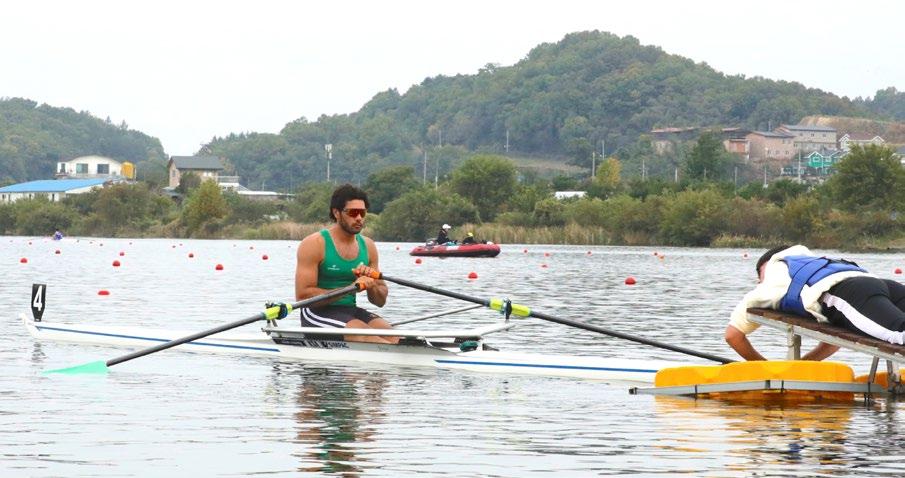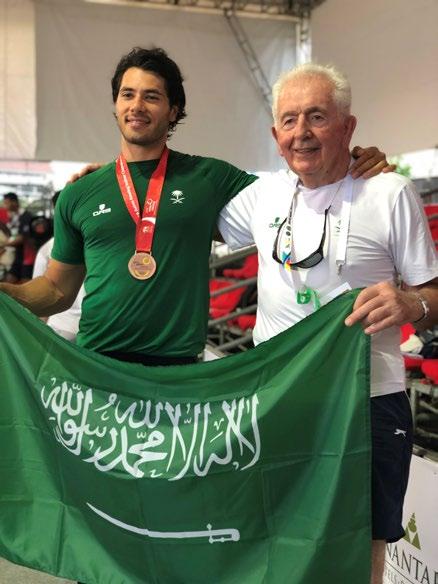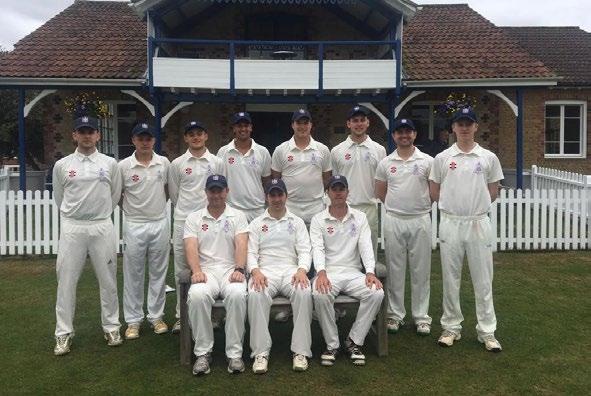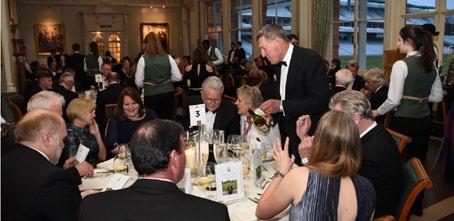
10 minute read
OC profile
Husein Alireza (G12)
Advertisement
F SAUDI’S ROWING HERO Husein Alireza is on the brink of becoming Saudi Arabia’s first Olympic rower. He explains his extraordinary journey to date, and the role that Charterhouse has played.
I had a great time at Charterhouse – I was always involved in sports: water polo, squash, football, fives and tennis. You’re kept busy all the time, either studying or doing sports. Five years of that sets you up for life.
It was a bit of a culture shock though. People are very self-motivated at Charterhouse and a lot of pupils already knew what they wanted to be. I can’t say that I did, but I knew I wanted to do something outstanding.
I tried rowing first when I was at Charterhouse. It was winter – so wet and windy. One of our friends, Sebastian English (G12), fell out of our eight! That was very funny. It was a tough experience though – blades everywhere.
When I left and went to Edinburgh, I had so much free time that I didn’t know what to do with it and did little exercise. But then I went to Cambridge for my Master’s and that was much more like Charterhouse, so I felt more at home. That’s where I started rowing.
On my first day at Hughes Hall I bumped into an Old Carthusian – Louis Speelmans (F12). We weren’t friends at School but bonded immediately and became best friends. Rowing was something we both wanted to try so we joined the Hughes Hall Boat Club. Initially, it was a social thing but my numbers began to improve quite quickly – so much so that the coach told me I should take the rowing further. I didn’t take him seriously until someone from the Cambridge Blue Boat approached me. He explained that the reason why he had started rowing was to find his ceiling, to see how far he could go. So I looked into it and realised the opportunity I had to represent my country internationally. At that point Saudi Arabia had never been represented for rowing. So there was an opportunity to be the first Saudi rower!
Then I stumbled across an article about an Indian man who started training in 2012 and qualified for the Rio Olympics in 2016. If he could do it, maybe I could too – even though I only had three years?
So I sent an email to the best rowing clubs in London and one interviewed me. At the interview I met my coach Bill Barry (silver medallist in the coxless fours at the 1964 Olympics – in Tokyo, funnily enough).



Husein pictured at the Asian Games with his coach, Bill Barry
He was looking for a project for Tokyo and he believed in me. At that point we said we’d give it a year and check numbers. After that first year, he said he had never seen numbers improve so drastically. And I do believe that is because I was so active at Charterhouse, creating that base level of fitness.
Training started in September 2017 and I entered a few domestic races. But the Asian Games, which is the second largest sports event in the world after the Olympics, was happening that summer and I wanted to compete. So immediately we had a goal with a very tight time frame.
Perhaps naively, I thought this was just a physical challenge, but it’s actually a mental one, too. I had to drop everything else. No work, no nothing. You have to be in bed by 10pm every night, including weekends. You’re up early, you’re saying no to invitations, including weddings and funerals. And initially it was hard for my friends to understand – especially as I wasn’t open about my end goal as I didn’t want the pressure. I was blessed to have a very supportive family and close friends though.
By August we got in touch with the Saudi Arabian Committee and asked them to enter me into the Asian Games. They too were supportive and loved the fact I was introducing a new sport to the region. I was entered and, when I got there, the magnitude hit me! My competitors were Olympians! The Indian man who had been my inspiration was there (I introduced myself and told him my story). It was surreal. Seeing the Saudi flag flying for the first time in a rowing event I just thought, “What are you doing here?!”
I did well and came third in the B final, 9th overall in Asia (out of 14 competitors) – better than we thought. To qualify for Tokyo, I must prove in a race this April that I am in the top five in Asia. Experience will be vital, because rowing is so technical. You can lose to someone less powerful than you purely due to technique. I just need to improve by a few seconds to be safe.
Mental focus is also vital. And the way to stay focused is to remember why you’re doing it: making history to be the first Olympian rower from Saudi Arabia. And it’s not just for me. Getting to Tokyo would mean a lot to my family and coach who have invested so much faith in me. Giving them that back would be incredible. b
F Whilst undertaking his training, Husein also founded the Saudi Rowing Federation, which is now building a course in Jeddah. It will be a training centre not just for Saudi Arabia, but for the region. On behalf of the Charterhouse community, we wish the best of luck to Husein and hope to cheer him on in Tokyo.
OC Fencing update
From épée to foil to sabre, there’s been plenty of fencing action to admire over the past year
Sunday 1 December saw ten members of the OC Fencing Club return to Charterhouse for the biennial match against the School. While the end result was a victory for the OCs (2–3), every match featured a number of well-contested bouts and many demonstrations of individual, as well as team, fencing talent from both sides.
The two foil matches quickly showed that the outcome of the whole day could not be easily predicted. The Foil A match resulted in a narrow victory for the OCs (44–45) – with four fencers (two from each side) scoring ten hits, a rare occurrence in any fencing match! Credit is due to the current School fencers for pushing that match right up until the last deciding bout, where Alex Beck (B15) secured victory after going level at 44-44. The School team drew the overall match result level with a 45–36 victory in the Foil B match.
Épée fencing is known for being slower in pace than foil fencing, although no less focused on precision and technique. The Épée A result saw the OCs victorious (24–45) while Épée B saw the School victorious (45–39). Due to international fencing commitments, the School was short on numbers so credit is due to their fencers, some of whom had to fence all three types of swords whilst the OCs were able to field a team where each fencer fenced two types of sword, allowing them more rest time between bouts.
At many competitions across the country, sabre fencing tends to be reserved until the final day or part of the event – either because it does not see quite as many entrants as foil and épée, or because it is sometimes seen as the liveliest and quickest contest, given its style and the ability to score a hit by the faintest of touches on an opponent’s electric jacket. On this occasion, we saw a closely fought encounter that resulted in victory for the OCs (42–45). The OCs loaned James Russell (W17) to the School, and the ensuing bouts were energetic and lively.
Thanks to the School for hosting us and for putting in a great deal of effort into their fencing, pushing it right up until the decisive sabre match. Special thanks to Charles Marsh (BH11–) for organising the event and to Mick Johnson, the School’s fencing coach, who is approaching 20 years with the School. b
F Any interested OCs who would like to join OC Fencing please get in touch – we would be very happy to include you, regardless of experience and level of fencing.
The Fencing team (from left to right): Charles Church (D), James Wright (H16), James McAllister (g), Pavel Degtiarev (V13), Antoine Grey (B13), Alexander Beck (B15), James Graham (H02), Toby Hindson (g82), Thomas McMahon (B09), Lesley Elphick, Charlotte Russell (F12), Micol Gianelli (F), James Russell (W17), Alexander Tsang (R), Oliver Skeen (R), Jordan Michael (g), Albert Ding (G)

Charterhouse Friars
2019 saw a rebuilt Friars line-up make a strong run to the semi-finals of the Cricketer Cup

The 2019 season kicked off in the iconic Long Room at Lord’s, with a dinner hosted by then MCC President Anthony Wreford (L70). Two hundred Friars and members of the OC Club gathered to celebrate the lives of two legendary Friars, John Victor (W73) and Anthony Allom (W57).
The 2019 Cricketer Cup campaign launched a few weeks later with warm-up fixtures against the Flashmen and the Grasshoppers – the latter being comfortably dispatched thanks to sparkling 100s from Alex Gilbert (L14) and Oli Pike (W08), only for rain to intervene and halt a result.
Round One of the Cup saw a reduced 40-over-a-side match due to rain. The Friars won the toss and Olly Batchelor (W14) went to task on the Old Hurst Johnian bowlers, amassing 150 not out in what will go down as one of the great Friars innings of recent times. James Hamblin (g96) joined for the last five overs to turbo-charge the run rate, and take the score to 261–2, with some supremely clean hitting. Understandably, the OHJ batsmen were deflated and bowled out for just 92 in response.
Round 2 saw the Friars drawn at home facing a strong Shrewsbury Saracens, and this time the bowlers set the tone – at one point the scoreboard read 11 for 6. Tom Gallyer (S12) stood out, with 4 for 20 from 10 consecutive overs. Shrewsbury admirably made it to 90 all out, but the runs were knocked off within 20 overs for the loss of just two wickets.

Old Bedfordians were next up in round three, once again on Green. Having got off to a flyer, Jimmy Hawkings (R17) and Jonny Charles (L16) put the brakes on, as Bedford made it 226–7. Coming up against an attack of six spin bowlers, our batters went about their business calmly, never once falling behind the rate.
Both Oli Pike and Ross Richardson (F19) passed 50, as the Friars made it home with four overs to spare and six wickets left in the shed.
The semi-final presented the Old Tonbridgians. Expectations were running high but the wheels of a flawless campaign were shortly to fall off and the team were bowled out for 77. But defeat in a semi-final is no disgrace and bodes well considering the amount of young blood bedded into the team.
With the Cricketer Cup run over, attention turned to the final fixture of the summer being the Free Foresters, played in 2019 for the first time in honour of Ed How (BH03–12). Ed’s wife Ruth and daughter Tilly were in attendance to watch an engaging day’s play, which saw over 500 runs scored and all three results possibly going into the final over of the day. The Foresters emerged victorious but a great day was had by all, and the Friars look forward to hosting the fixture and the How family in years to come.
Many thanks must go to Lee Marshallsay and his team, Bob Noble (BH77–14), Fuzzy Hogg (B91, BH19+) and Sue Schofield, as well as the rest of the Friars committee. b










